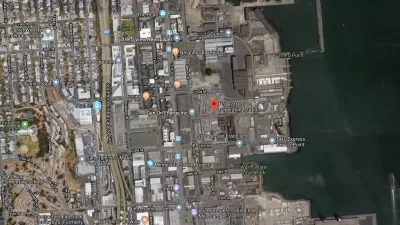Designers and architects in Charlotte, North Carolina are asking the city to raise the bar when approving new apartment buildings to prevent more of the repetitive wood-frame design that has swept the city.

Reporting in the Charlotte Observer, Ely Portillo writes that a growing chorus of critics is taking the city of Charlotte to task for approving "a bland wave of construction." Urban designers, planners, and architects are calling for tighter standards to regulate the four- and five-story apartment buildings that are mostly indistinguishable from each other, and tend to lack the basic elements necessary for pedestrian friendly environments, including ground floor retail and restaurants.
Ken Szymanski of the Greater Charlotte Apartments Association argues that including amenities, such as ground floor commercial uses, into new apartment buildings will increase the cost. Those costs would be transferred to tenants in the form of higher rents.
“The cost for higher architecture will be higher,” Szymanski said. Putting a restaurant into an apartment building on the ground floor can require different construction skills and more attention to fire code requirements. “Everybody likes quality, but not everywhere can be high-end.”
Szymanski said ground-floor retail only works in the densest corridors.
“Mandating it is usually a recipe for failure,” he said.
In response to the wave of new development, Charlotte has begun a rewrite of its zoning code, but it likely won't be completed for four more years.
FULL STORY: Why so many of Charlotte’s new apartments look alike (and why some are calling for change)

Maui's Vacation Rental Debate Turns Ugly
Verbal attacks, misinformation campaigns and fistfights plague a high-stakes debate to convert thousands of vacation rentals into long-term housing.

Planetizen Federal Action Tracker
A weekly monitor of how Trump’s orders and actions are impacting planners and planning in America.

In Urban Planning, AI Prompting Could be the New Design Thinking
Creativity has long been key to great urban design. What if we see AI as our new creative partner?

Florida Seniors Face Rising Homelessness Risk
High housing costs are pushing more seniors, many of them on a fixed income, into homelessness.

Massachusetts Budget Helps Close MBTA Budget Gap
The budget signed by Gov. Maura Healey includes $470 million in MBTA funding for the next fiscal year.

Milwaukee Launches Vision Zero Plan
Seven years after the city signed its Complete Streets Policy, the city is doubling down on its efforts to eliminate traffic deaths.
Urban Design for Planners 1: Software Tools
This six-course series explores essential urban design concepts using open source software and equips planners with the tools they need to participate fully in the urban design process.
Planning for Universal Design
Learn the tools for implementing Universal Design in planning regulations.
Gallatin County Department of Planning & Community Development
Heyer Gruel & Associates PA
JM Goldson LLC
City of Camden Redevelopment Agency
City of Astoria
Transportation Research & Education Center (TREC) at Portland State University
Jefferson Parish Government
Camden Redevelopment Agency
City of Claremont





























